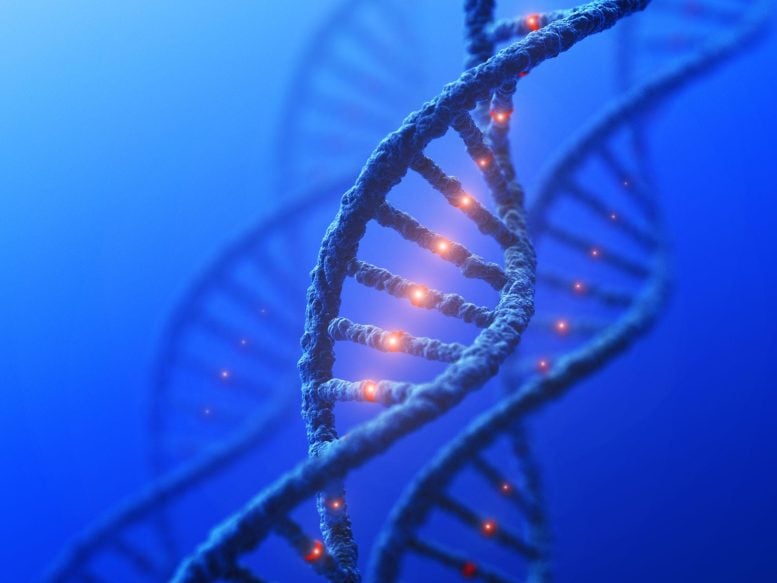
Researchers at UCL have uncovered the biology behind a rare genetic mutation in the FAAH-OUT gene, explaining Jo Cameron’s near-painless existence, rapid healing, and low anxiety.
New research from University College London (UCL) has unraveled the biology behind a unique genetic mutation that results in its carrier experiencing minimal pain, enhanced healing, and lower levels of anxiety and fear.
Published in the journal Brain, the research is a follow-up to the team’s 2019 discovery of the FAAH-OUT gene and its rare mutations, which make Jo Cameron almost immune to pain, and devoid of fear and anxiety. The latest study elucidates how this mutation reduces the expression of the FAAH gene and impacts other molecular pathways associated with mood and wound healing. The insights garnered from these findings could potentially pave the way for novel drug targets and foster further research in these domains.
Jo, who lives in Scotland, was first referred to pain geneticists at UCL in 2013, after her doctor noticed that she experienced no pain after major surgeries on her hip and hand. After six years of searching, they identified a new gene that they named FAAH-OUT, which contained a rare genetic mutation. In combination with another, more common mutation in FAAH, it was found to be the cause of Jo’s unique characteristics.
From Junk DNA to Key Regulator
The area of the genome containing FAAH-OUT had previously been assumed to be ‘junk’ DNA that had no function, but it was found to mediate the expression of FAAH, a gene that is part of the endocannabinoid system and that is well-known for its involvement in pain, mood, and memory.
In this study, the team from UCL sought to understand how FAAH-OUT works at a molecular level, the first step towards being able to take advantage of this unique biology for applications like drug discovery.
This included a range of approaches, such as CRISPR-Cas9 experiments on cell lines to mimic the effect of the mutation on other genes, as well as analyzing the expression of genes to see which were active in molecular pathways involved with pain, mood, and healing.
The team observed that FAAH-OUT regulates the expression of FAAH. When it is significantly turned down as a result of the mutation carried by Jo Cameron, FAAH enzyme activity levels are significantly reduced.
Dr. Andrei Okorokov (UCL Medicine), a senior author of the study, said: “The FAAH-OUT gene is just one small corner of a vast continent, which this study has begun to map. As well as the molecular basis for painlessness, these explorations have identified molecular pathways affecting wound healing and mood, all influenced by the FAAH-OUT mutation. As scientists, it is our duty to explore and I think these findings will have important implications for areas of research such as wound healing, depression, and more.”
Genetic Pathways Altered by FAAH-OUT Mutation
The authors looked at fibroblasts taken from patients to study the effects of the FAAH-OUT-FAAH axis on other molecular pathways. While the mutations that Jo Cameron carries turn down FAAH, they also found a further 797 genes that were turned up and 348 that were turned down. This included alterations to the WNT pathway that is associated with wound healing, with increased activity in the WNT16 gene that has been previously linked to bone regeneration.
Two other key genes that were altered were BDNF, which has previously been linked to mood regulation and ACKR3, which helps to regulate opioid levels. These gene changes may contribute to Jo Cameron’s low anxiety, fear, and pain.
Professor James Cox (UCL Medicine), a senior author of the study, said: “The initial discovery of the genetic root of Jo Cameron’s unique phenotype was a eureka moment and hugely exciting, but these current findings are where things really start to get interesting. By understanding precisely what is happening at a molecular level, we can start to understand the biology involved and that opens up possibilities for drug discovery that could one day have far-reaching positive impacts for patients.”
Reference: “Molecular basis of FAAH-OUT-associated human pain insensitivity ” by Hajar Mikaeili, Abdella M Habib, Charlix Wai-Lok Yeung, Sonia Santana-Varela, Ana P Luiz, Kseniia Panteleeva, Sana Zuberi, Alkyoni Athanasiou-Fragkouli, Henry Houlden, John N Wood, Andrei L Okorokov and James J Cox, 24 May 2023, Brain.
DOI: 10.1093/brain/awad098
The study was funded by the Medical Research Council (MRC) and Wellcome.
Never miss a breakthrough: Join the SciTechDaily newsletter.